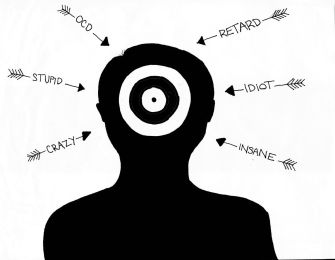There seems to be a growing awareness of mental illness. Wellness Week, put on by the Wellness Center, brought mental health to mind. Buzzfeed launched a mental health week for the on Dec. 6. Discussions have begun on the Senate floor surrounding sufficient funding. But we are still nowhere near full societal acceptance of mental illness.
Target recently released a sweatshirt saying “OCD: Obsessive Christmas Disorder.” Outraged followed, as it should have. People with Obsessive Compulsive Disorder felt the corporation was belittling their illness.
Most seem to know that “retarded” isn’t an acceptable insult, as it is exclusionary and offensive. But what about words like OCD, idiotic, or crazy? Crazy is defined as a mentally deranged person and idiot is an archaic term to describe a mentally handicapped person. The usage of these words perpetuates a negative perception of mental illness.
Approximately 18.5 percent of U.S. adults suffer from a mental illness, according to the National Institute of Mental Health. So when you use a word like “crazy” or “insane,” think about the millions of people all across the US who just might be battling a disorder.
Though we may not feel like we are trivializing mental illness because we are not purposefully discriminating against those suffering from it, they may be feeling self-stigma. This is when society’s beliefs begin to seep into the minds of those with mental illnesses and make them begin to believe that it is their fault, or that they are not able or not worthy of recovery, according to the Association of Psychological Science. The association reported that only 59.6 percent of adults with mental illnesses received treatment, despite its availability.
The Association of Psychological Science stated that cultural and societal beliefs about mental illness affect how willing people are to get treatment. If the beliefs surrounding treatment are positive, people will respond and will be more open to seeking help. But if they are negative, then the effect will be the opposite.

We’re creating this environment. Our words have the power to change someone’s life. If we take care of what we say, we can show those suffering that it is okay to get help. But the words we use that perpetuate this dismissive image surrounding mental illness are creating the opposite atmosphere, and that’s where we can make a change.
Mental illness is often treatable, yet many suffer in silence. When people sprain ankles, they talk about it openly. But when people have depression, it is almost never spoken about out loud. The inability to get treatment and feelings of isolation can worsen the mental illness. For example, people with depression naturally feel removed, and when society pushes them even further because of their illness, it can worsen.
This stigma of mental health is reinforced every day. Portrayals of the mentally ill being violent, homicidal or suicidal are on the television and in movies all the time. This negative image has seeped into our everyday language, most of it without our knowing.
According to an article in The Guardian, the stigma of mental health can lead to decreased funding for treatment services or difficulty finding a job.
Words such as “insane” or “stupid” are not usually meant to describe a person with a mental illness directly, but instead somebody who was “acting crazy” because they were doing something uncommon. Yet these words are almost always used negatively, thus perpetuating an image that anything related to “insane” or “psycho” is bad.
Even saying “I’m being so OCD right now” makes it clear that having Obsessive Compulsive Disorder is something to be joked about, when it actually is a large part of some people’s lives. The same is true for the phrase, “I’m so ADD.” These are sentences we hear every day. Yet, if you were to hit your knee, you wouldn’t say “I’m so disabled.” So why is it that using the language of mental health in a trivialized way is socially acceptable?
Mental health shouldn’t be portrayed any differently than physical health. When you break your leg or get sick, you see the doctor. The same should be true for mental health, yet somehow we separate these two into different spheres. Both need treatment, only one is for your body and the other is for your mind. In the end, if we are trying to destigmatize mental illness, we can start this by changing the words we use every day.
I’m not asking you to cut out every word in your vocabulary that might have some connection to mental illness. Instead, I ask that you think before you speak. It’s okay to say the wrong thing, as long as you are mindful of the effect your words can have.






